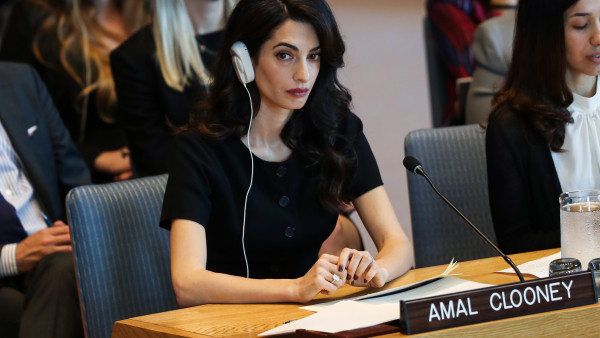The days of holding individuals unaccountable for how they use their platforms are over, writes Ruqaiya Haris [photo credit: Getty Images]
Amal Clooney had her ‘gotcha’ moment yesterday when it was revealed she’d been advising ICC prosecutor Karim Khan on issuing arrest warrants for Israel’s war on Gaza.
The human rights lawyer of Palestinian and Lebanese descent had been heavily criticised for not speaking out about Israel’s ongoing genocide, with TikTok and X awash with conspiracy and critique over her silence. But now it seems Amal Clooney has ‘uno-reversed’ us all.
Despite the usual, sanctimonious outrage from Israel’s patron the United States, it seems that charges of “war crimes and crimes against humanity” against Benjamin Netanyahu and Yoav Gallant has broad international support. So were we wrong about Amal Clooney?
“Amal Clooney was accused of doing nothing when she was doing something, and that should be acknowledged”
Amal Clooney takes a step in the right direction
We’re all guilty of mistaking social media activism — or lack of — as an indicator of political will, often because it’s the easiest way to voice our opinion.
But, as yesterday showed, the challenge is to recognise those who participate in direct action who aren’t visible online at all.
While neither Karim Khan nor Amal Clooney are known for their radical politics, they have on this occasion aligned with the Palestinian cause.
That doesn’t make Amal Clooney beyond reproach though, far from it. Social media users and pro-Palestinian voices were quick to highlight the disproportionate changes levelled at Hamas compared to the Israelis.
Some even went as far as to accuse Khan and Clooney of careerism.
But the fact is Amal Clooney was accused of doing nothing when she was doing something, and that should be acknowledged.
Does having no social presence online make you less ‘valuable’?
No, it’s often the empty vessels that make the most noise, as the adage goes. There is more to activism than social media — clearly the action taken by Amal Clooney will have more of a tangible effect than if she’d simply posted about it.
That said, unprecedented times lead to unprecedented outrage. Who are we to police each other’s grief?
Loud, public, and unapologetic solidarity have never been so important. Our hearts and minds have turned whole countries in Palestine’s favour, with Israeli hasbara capitulating before our eyes.
In previous wars on Gaza and the Palestinian people, skewed, biased public opinion, manufactured consent and indifference had allowed Israel to conduct its crimes unabated. Even mentioning the word Palestine had been taboo.
No more. In our thousands and in our millions — on the street and on the timeline — leaders know it’s no longer business as usual. Our persistent voice and Amal Clooney’s action may be the first steps in bringing about real justice.
Boycott businesses, boycott individuals
We’ve seen with the global student encampments what organising for Palestine can achieve. From firefighters refusing to police protests, dock workers refusing to assist genocide, and doctors marching in solidarity with their colleagues, society has mobilised for Palestine like never before.
So within this context, yes, silence is a choice. And it’s often the easiest choice, especially for public figures whose personal brand makes them allergic to anything remotely controversial.
And whilst this may not directly apply to Amal Clooney — save for her marriage with her husband George Clooney — I don’t blame pro-Palestinian supporters for wanting more from public figures who benefit from the access, wealth, and privilege needed to make a change.
Remember, the previous backlash against Amal Clooney came amid a wider backdrop of criticism of celebrity culture and their inaction over Gaza. The #Blockout2024 social media trend instructed users to block celebrities who had yet to speak out against Israeli atrocities in Gaza. The aim was to impact their online profile and pressure them into using their platforms for good.
Several events have catalysed further boycotts. The juxtaposition of million-dollar dresses at the Met Gala with strewn body parts in Rafah highlighted the extent of Western conditioning and apathy towards Palestinian suffering. Imagine if those same people had mobilised for Gaza? The disconnect between the two remains stark.
Targeted boycotts are no longer for corporations like Starbucks and McDonald’s but for individuals who prioritise themselves over the suffering of others. Apolitical feel-good content doesn’t appease us any more — the personal has always been political and we have our eyes and ears open to those who avoid it.
And while we may have been wrong about Amal Clooney — there is undoubtedly more than meets the eye — the era of not holding individuals accountable for how they use their platforms is at an end. We challenge more celebrities to prove us wrong, to show us how they do use their power for Palestine, and to encourage their peers to do the same.
Ruqaiya Haris is a freelance writer and social media content producer whose work on contemporary social issues ranges from faith and identity to the environment.
Follow her on X: @ruqaiya_h
Have questions or comments? Email us at: editorial-english@newarab.com
Opinions expressed in this article remain those of the author and do not necessarily represent those of The New Arab, its editorial board or staff.


